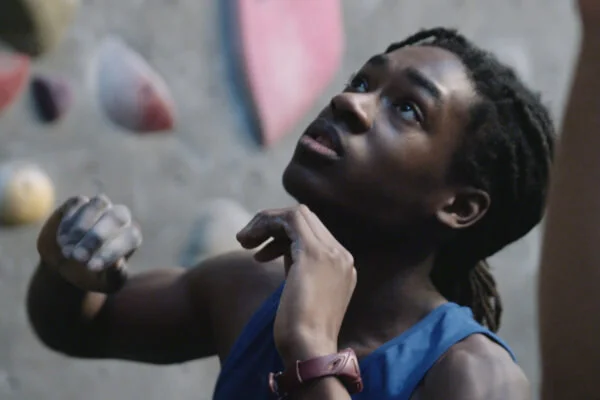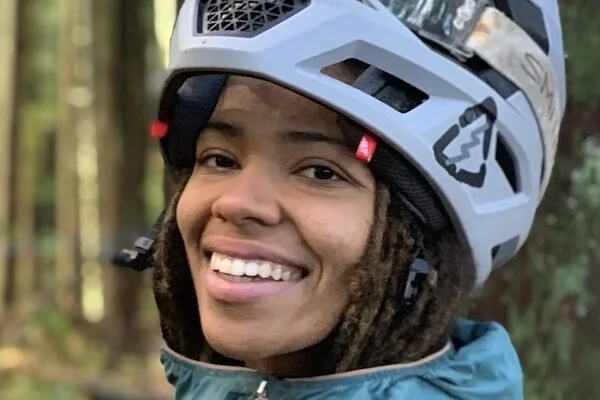Colour the Trails brings diversity to the screen at the Vancouver International Mountain Film Festival
The group for BIPOC individuals interested in outdoor pursuits hosts a show at the fest’s online Fall Series
Colour the Trails founder Judith Kasiama is dedicating her career to getting more BIPOC individuals outdoors and to getting the outdoor industry to wake up to its lack of diverse representation.
The Vancouver International Mountain Film Festival runs online from November 20 to 29.
JUDITH KASIAMA’S PATH to the great outdoors on Canada’s West Coast was a long one, beginning in her birthplace of the Democratic Republic of the Congo. Her family fled ongoing conflict as refugees, and, she lived in several other places, including South Africa, Australia, and the United States, before moving to Toronto. Seeking warmer weather, Kasiama headed to Vancouver in 2010.
Kasiama has always been active outdoors, and nature has always been an important part of her life. Here in B.C., she fell in love with places like Joffre Lakes Provincial Park—which she hiked before it became overrun thanks to social media.
“It was a gorgeous summer day when we went, and it was just spectacular,” Kasiama says of the hike 35 kilometres east of Pemberton. “It was a completely different landscape from everywhere else I’ve lived. Seeking the three lakes and the colour of the water… I felt like I was in a National Geographic magazine. It almost felt too unreal to believe I have access to this for free.
“Nature is cheaper than therapy,” she says with a laugh. “That’s my thing. Being out in nature is very healing, a way to de stress, to re-evaluate where I am and where I’m planning on going.”
Kasiama has gone from enjoying adventures in her downtime to making the outdoors her career. She’s the founder of Colour the Trails, a community-based business geared to BIPOC individuals and their allies who are interested in hiking, camping, mountain biking, kayaking, skiing, snowboarding and other outdoor pursuits. The group has a prominent role at the 2020 Fall Series of the Vancouver International Mountain Film Festival online (November 20 to 29). The Colour the Trails Show consists of five films that spotlight BIPOC individuals doing wonderful things outdoors, and Kasiama is moderating the festival’s Moving Beyond Diversity panel discussion on November 25.
While Kasiama is ever in awe by the sights of mountains, rivers, lakes, forests, and streams, she was driven to turn her passion for nature into her life’s work because of what she wasn’t seeing.
“A lot of it came out of sheer frustration,” says Kasiama, who studied history and international development at university. “Actively participating in the outdoors, I would go to a lot of brands to purchase gear but I didn’t see a clear representation of how diverse our trails are. I felt like the media constantly was projecting this stereotype that it’s usually just white people in nature or just white men or white families doing this. For me I was thinking, ‘No, I love doing these things and I’m pretty sure there’s a lot of People of Colour also who love doing these things, so why are we not showcasing that representation?’
“There is a problem with how brands market their stuff; they don’t showcase the diversity of people,” she says. “I wanted to break that stereotype and say ‘Hey, I’m here. I’m doing this.’ I wanted to create a community where, if people are new and want to try nature but want to do it in a safe space, I can go with them. I want people to recognize that you don’t have to be hard core; it starts with one hike. Then you do two hikes, then before you know it, it becomes part of your life and it becomes something you’re passionate about and you don’t have to be an expert. We can all learn as we go together.”
Kasiama notes that the idea of being out in wild, remote places can be intimidating for many; for BIPOC women in particular, it may feel especially unsafe. She has noticed that many companies have launched aggressive marketing campaigns to get more women involved in outdoor sports, such as mountain biking and snowboarding. She’d like to see similar energy directed to supporting BIPOC initiatives, to breaking down barriers and making the outdoors a safe and welcoming place for everyone.
She has been encouraging people to get outside for years, having formalized Colour the Trails in 2017. Despite the organization not being new, she says the recent surge in awareness of Black Lives Matter following the murder of George Floyd seems to have brought on more interest in her work.
“All of a sudden there’s that switch,” she says. “It’s great but also at times I struggle with it: is it tokenistic or is this a trend? Why is this? Anybody I’m working with I’m asking that we work in partnership, not just once but for the next couple of years to work together because this is not a one-time solution. This is going to require all of us actively working together get to point where don’t have to talk about it.
“I’ve never taken marketing courses but it’s just super logical if you are a brand that’s hoping to grow and expand, why are you only catering to specific demographics, especially in Canada? There’s so many people from different parts of the world, so why don’t you want to tap into this community? I think much of it is the assumption that if you’re a Black person, you don’t have money to spend, or if you’re a Person of Colour you don’t have financial resources. Whereas no, you have just excluded us form this space.”
To showcase more BIPOC individuals out in nature, Colour the Trails held its own mini film fest this past February, during Black History Month. Kasiama wanted to inspire people to access the outdoors. In her experience in the past, many fests haven’t reflected the diversity that she’s part of, and so she was delighted to team up with Vancouver International Mountain Film Festival for its Colour the Trails Show. She’s excited to share stories of people she knows who are doing extraordinary things outside.
“Hopefully those stories can inspire everybody—not just Black people or BIPOC, but all of us—to re-examine how we relate to nature and how we have access to nature and to ask: what are some of things that hinder us in terms of accessibility? What can we, as a collective, do to bring that transformation so that we are creating this inclusive space when it comes to outdoor industry?”
True Calling is about Haitian-born Vancouver twins who are excelling at competitive climbing.
Two of the films in Colour the Trails Show are local. Snowboarder Tamo Campos, director of Ru-tsu, takes viewers on an educational journey on which he learns about his Japanese ancestry and his activist roots. He spends time with his grandfather, esteemed environmentalist and broadcaster David Suzuki, in the personal film that delves into themes of intergenerational trauma, passionate activism, and a family’s respect for and love of nature.
True Calling is about twin brothers from Haiti who grew up climbing everything in sight – the walls, the roof, the monkey bars, anything. Their parents took them to a climbing gym when they were nine, and the boys, now living in Vancouver, fell in love with the sport. They started competing two years later and are now, nearing age 18, winning competitions worldwide.
In This Land, runner and activist Faith E. Briggs runs 150 miles through three U.S. National Monuments that are at the centre of intense controversy around public lands. In The Mirnavator, ultra-runner Mirna Valerio overcomes negative voices that tell her she doesn’t belong in the sport. Becoming Ruby is about mountain biker, skier, and artist Brooklyn Bell, who, after not seeing herself reflected in the community she loves, created her own role model: a hand-drawn, unapologetically Black hero called Ruby J.
(Other key events at the 2020 VIMFF are Environmental Show, Climbing Show, Snowsports Show, and Mountain Culture Show.)
Not seeing herself reflected in the community she loves, mountain biker and skier Brooklyn Bell created her own role model: a hand-drawn hero called Ruby J. Becoming Ruby tells her story.
Joining Kasiama in the Moving Beyond Diversity panel discussion are Becoming Ruby’s Bell and Raheim Robinson, a New York City-based creative director, producer, and climber who works to create safe spaces for Black and Brown youth in underserved communities. (Colour the Trails Show and Moving beyond Diversity are sponsored by Liv Cycling.)
The talk will emphasize with a focus on real steps people can take in their own communities to foster change. This is important to Kasiama and so many others advocating for action.
“I’m hearing the word diversity a lot,” she says. “The word diversity is just being thrown around, but I want to see: what are the tangible solutions that we can implement in terms of inclusion? What does inclusion look like? I can talk to you here about diversity and inclusion, but if I’m not doing anything actionable to make the outdoor space inclusive then my words don’t match anything.”
This past June, Colour the Trails hosted an intro to mountain biking course and seven BIPOC women signed on to continue learning afterward. Members of the North Shore Mountain Biking Association have been teaching them, and Essential Cycles has provided equipment and gear. “For me, that’s how inclusion works: finding practical solutions and partners and allies so we can work together to bring that inclusion in, versus just talking about it,” Kasiama says.
Colour the Trails is expanding: it has a chapter in Alberta as well as two in the US, though the latter are on pause due to COVID-19 and the current racial climate in the U.S. Kasiama is hoping to host a back-country sills and ski camp this winter. Ultimately, she’d like to start a scholarship program and help more BIPOC members get into the guiding industry, which is very white, she says.
Kasiama says she lives by a quote by poet and civil-rights activist Maya Angelou: "If you don’t like something change it. If you can’t change it, change your attitude." “I love the outdoors and this is my community. I meet amazing individuals out there and I want to change what the outdoor industry looks like. Our goal is to be leading that conversation and changing that narrative and providing people opportunities where perhaps they thought they did not have any.”
















